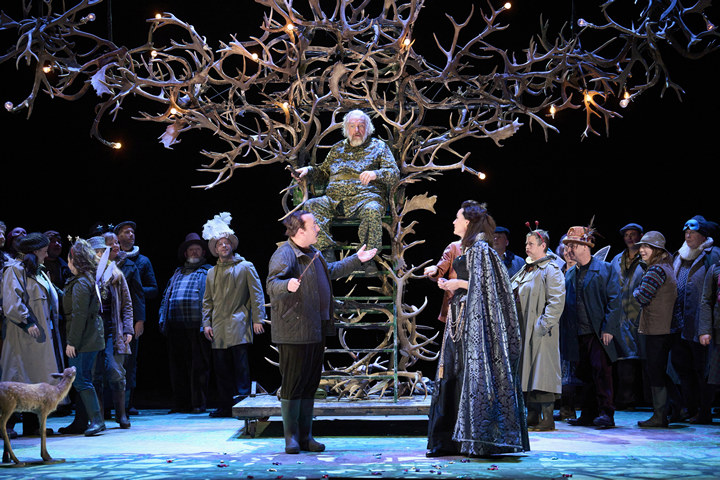| Opera Reviews | 28 April 2024 |
Olivia Fuchs' lively production sweeps us along pell-mellby Catriona Graham |
|
Verdi: Falstaff |
|
 |
|
|
Whether you actually like Verdi’s opera Falstaff depends on whether you enjoy practical jokes and playing tricks on people, because the story relates how a poor old man, seeking an income-stream to fund his alcohol addiction, is mocked and humiliated by well-heeled and comfortably-off young people. In Opera North’s production, set in a brightly-coloured Eighties, Falstaff is living a late-hippy-ish existence in a caravan, with various bits of furniture sitting outside, and drinking with his mates Bardolph and Pistol (Colin Judson and Dean Robinson). Oh, and Doctor Caius (Paul Nilon), who drank rather a lot in their company and who they (slickly) relieve of his wallet. Dunned by the landlord, Falstaff needs money and convinces himself that two of the town’s young matrons, Alice and Meg, fancy him and will spend their husbands’ money on him. Bardolph and Pistol refuse to carry his love-letters and instead tell the tale to their husbands. Alice’s husband, Ford, plots revenge. The tennis-playing ladies concerned are quite flattered, until they realise he sent identical letters, whereupon they hatch a plot against Falstaff. The game, as it were, is afoot. Henry Waddington makes a fine Falstaff, enough to engage some sympathy when he emerges from the laundry basket in which he was tipped into the Thames. Kate Royal is an entertaining Alice, hamming up to the amusement of her female friends. Meg (Helen Evora) is a good foil, the first to admit to a letter from Sir John, albeit upstaged by Alice waving her own letter. Mistress Quickly, the older woman of the group and the designated go-between to set up the plot, is well-played by Louise Winter, who oozes obsequiousness in her conversation with Falstaff, and a weary acceptance when she is left the witch’s hat in Alice’s divvying up of disguises. Richard Burkhard is pompous as Ford and, in disguise, expansive as Master Brook. Ford’s efforts to entrap his wife in suspected infidelity turn into a farce with policemen, baker (complete with rolling-pin) and other townsmen rampaging through her bedroom in particular and the house in general, in search of Falstaff. The ‘discovery’ turns out to be of Ford’s daughter Nannetta (Isabelle Peters) and her boyfriend, the tennis coach Master Fenton (Egur Zhuravskii), listening to a cassette and writing – poetry? There are some nice touches, like Ford’s visit (as Brook) to Falstaff’s caravan and standing below the antlers, mirrored in due course by Falstaff’s appearance at Herne’s Oak (created out of antlers) wearing his own antlers. The double-crossing of Ford, as regards the marriage of Nannetta to Fenton, instead of the intended Doctor Caius, is another triumph of the merry wives. This is very much an ensemble piece, with conductor Garry Walker and director Olivia Fuchs sweeping us along pell-mell. It’s a pity, then, that the scene-changes slow the tempo, although Leslie Travers’ designs are worth the wait. Paule Constable and Ben Pickersgill effectively light the passing day and midnight. The curtain of ribbons makes a good frame for the finales – the laughter at Falstaff in the Thames which ends the first half, and the acceptance in laughter of all the ruses and tricks at the end. |
|
Photo © Richard H Smith |
|







